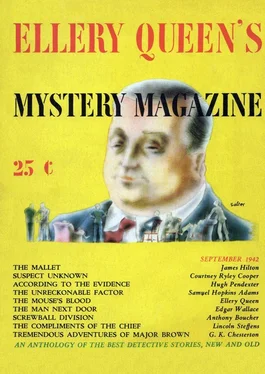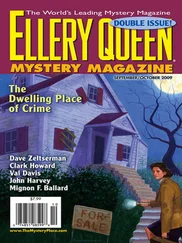Энтони Бучер - Ellery Queen’s Mystery Magazine. Vol. 3, No. 4, September 1942
Здесь есть возможность читать онлайн «Энтони Бучер - Ellery Queen’s Mystery Magazine. Vol. 3, No. 4, September 1942» весь текст электронной книги совершенно бесплатно (целиком полную версию без сокращений). В некоторых случаях можно слушать аудио, скачать через торрент в формате fb2 и присутствует краткое содержание. Город: New York, Год выпуска: 1942, Издательство: The American Mercury, Жанр: Детектив, на английском языке. Описание произведения, (предисловие) а так же отзывы посетителей доступны на портале библиотеки ЛибКат.
- Название:Ellery Queen’s Mystery Magazine. Vol. 3, No. 4, September 1942
- Автор:
- Издательство:The American Mercury
- Жанр:
- Год:1942
- Город:New York
- ISBN:нет данных
- Рейтинг книги:4 / 5. Голосов: 1
-
Избранное:Добавить в избранное
- Отзывы:
-
Ваша оценка:
- 80
- 1
- 2
- 3
- 4
- 5
Ellery Queen’s Mystery Magazine. Vol. 3, No. 4, September 1942: краткое содержание, описание и аннотация
Предлагаем к чтению аннотацию, описание, краткое содержание или предисловие (зависит от того, что написал сам автор книги «Ellery Queen’s Mystery Magazine. Vol. 3, No. 4, September 1942»). Если вы не нашли необходимую информацию о книге — напишите в комментариях, мы постараемся отыскать её.
Ellery Queen’s Mystery Magazine. Vol. 3, No. 4, September 1942 — читать онлайн бесплатно полную книгу (весь текст) целиком
Ниже представлен текст книги, разбитый по страницам. Система сохранения места последней прочитанной страницы, позволяет с удобством читать онлайн бесплатно книгу «Ellery Queen’s Mystery Magazine. Vol. 3, No. 4, September 1942», без необходимости каждый раз заново искать на чём Вы остановились. Поставьте закладку, и сможете в любой момент перейти на страницу, на которой закончили чтение.
Интервал:
Закладка:
One certain bright and windy afternoon, the major, attired in his usual faultless manner, had set out for his usual constitutional. In crossing from one great residential thoroughfare to another, he happened to pass along one of those aimless-looking lanes which lie along the back-garden walls of a row of mansions, and which in their empty and discolored appearance give one an odd sensation as of being behind the scenes of a theatre. But mean and sulky as the scene might be in the eyes of most of us, it was not altogether so in the major’s, for along the coarse gravel footway was coming a thing which was to him what the passing of a religious procession is to a devout person. A large, heavy man, with fish-blue eyes and a ring of irradiating red beard, was pushing before him a barrow which was ablaze with incomparable flowers. There were splendid specimens of almost every order, but the major’s own favorite pansies predominated. The major stopped and fell into conversation, and then into bargaining. He treated the man after the manner of collectors and other mad men — that is to say, he carefully and with a sort of anguish selected the best roots from the less excellent, praised some, disparaged others, made a subtle scale ranging from a thrilling worth and rarity to a degraded insignificance, and then bought them all. The man was just pushing off his barrow when he stopped and came close to the major.
“I’ll tell you what, sir,” he said. “If you’re interested in them things, you just get on to that wall.”
“On the wall!” cried the scandalized major, whose conventional soul quailed within him at the thought of such fantastic trespass.
“Finest show of yellow pansies in England in that there garden, sir,” hissed the tempter. “I’ll help you up, sir.”
How it happened no one will ever know, but that positive enthusiasm of the major’s life triumphed over all its negative traditions, and with an easy leap and swing that showed that he was in no need of physical assistance, he stood on the wall at the end of the strange garden. The second after, the flapping of the frock-coat at his knees made him feel inexpressibly a fool. But the next instant all such trifling sentiments were swallowed up by the most appalling shock of surprise the old soldier had ever felt in all his bold and wandering existence. His eyes fell upon the garden, and there across a large bed in the centre of the lawn was a vast pattern of pansies; they were splendid flowers, but for once it was not their horticultural aspects that Major Brown beheld, for the pansies were arranged in gigantic capital letters so as to form the sentence
A kindly looking old man with white whiskers was watering them.
Brown looked sharply back at the road behind him; the man with the barrow had suddenly vanished. Then he looked again at the lawn with its incredible inscription. Another man might have thought he had gone mad, but Brown did not. When romantic ladies gushed over his V. C. and his military exploits, he sometimes felt himself to be a painfully prosaic person, but by the same token he knew he was incurably sane. Another man, again, might have thought himself a victim of a passing practical joke, but Brown could not easily believe this. He knew from his own quaint learning that the garden arrangement was an elaborate and expensive one; he thought it extravagantly improbable that any one would pour out money like water for a joke against him. Having no explanation whatever to offer, he admitted the fact to himself, like a clear-headed man, and waited as he would have done in the presence of a man with six legs.
At this moment the stout old man with white whiskers looked up, and the watering-can fell from his hand, shooting a swirl of water down the gravel path.
“Who on earth are you?” he gasped, trembling violently.
“I am Major Brown,” said that individual, who was always cool in the hour of action.
The old man gaped helplessly like some monstrous fish. At last he stammered wildly, “Come down — come down here!”
“At your service,” said the major, and alighted at a bound on the grass beside him, without disarranging his silk hat.
The old man turned his broad back and set off at a sort of waddling run towards the house, followed with swift steps by the major. His guide led him through the back passages of a gloomy but gorgeously appointed house, until they reached the door of the front room. Then the old man turned with a face of apoplectic terror dimly showing in the twilight.
“For Heaven’s sake,” he said, “don’t mention jackals.”
Then he threw open the door, releasing a burst of red lamplight, and ran downstairs with a clatter.
The major stepped into a rich, glowing room, full of red-copper and peacock and purple hangings, hat in hand. He had the finest manners in the world, and, though mystified, was not in the least embarrassed to see that the only occupant was a lady, sitting by the window, looking out.
“Madam,” he said, bowing simply, “I am Major Brown.”
“Sit down,” said the lady; but she did not turn her head.
She was a graceful, green-clad figure, with fiery red hair and a flavor of Bedford Park. “You have come, I suppose,” she said, mournfully, “to tax me about the hateful title-deeds.”
“I have come, madam,” he said, “to know what is the matter — to know why my name is written across your garden. Not amicably, either.”
He spoke grimly, for the thing had hit him. It is impossible to describe the effect produced on the mind by that quiet and sunny garden scene, the frame for a stunning and brutal personality. The evening air was still, and the grass was golden in the place where the little flowers he studied cried to Heaven for his blood.
“You know I must not turn round,” said the lady; “every afternoon till the stroke of six I must keep my face turned to the street.”
Some queer and unusual inspiration made the prosaic soldier resolute to accept these outrageous riddles without surprise.
“It is almost six,” he said; and even as he spoke the barbaric copper clock upon the wall clanged the first stroke of the hour. At the sixth the lady sprang up and turned on the major one of the queerest and yet most attractive faces he had ever seen in his life — open and yet tantalizing, the face of an elf.
“That makes the third year I have waited,” she cried. “This is an anniversary. The waiting almost makes one wish the frightful thing would happen once and for all.”
And even as she spoke a sudden rending cry broke the stillness. From low down on the pavement of the dim street (it was already twilight) a voice cried out with a raucous and merciless distinctness:
“Major Brown, Major Brown, where does the jackal dwell?”
Brown was decisive and silent in action. He strode to the front door and looked out. There was no sign of life in the blue gloaming of the street, where one or two street lamps were beginning to light their lemon sparks. On returning he found the lady in green trembling.
“It is the end,” she cried, with shaking lips; “it may be death for both of us. Whenever—”
But even as she spoke her speech was cloven by another hoarse proclamation from the dark street, again horribly articulate.
“Major Brown, Major Brown, how did the jackal die?”
Brown dashed out of the door and down the steps, but again he was frustrated; there was no figure in sight, and the street was far too long and empty for the shouter to have run away. Even the rational major was a little shaken as he returned at a certain time to the drawing-room. Scarcely had he done so than the terrific voice came:
“Major Brown, Major Brown, where did—”
Brown was in the street almost at a bound, and he was in time — in time to see something which at first glance froze the blood. The cries appeared to come from a decapitated head resting on the pavement.
Читать дальшеИнтервал:
Закладка:
Похожие книги на «Ellery Queen’s Mystery Magazine. Vol. 3, No. 4, September 1942»
Представляем Вашему вниманию похожие книги на «Ellery Queen’s Mystery Magazine. Vol. 3, No. 4, September 1942» списком для выбора. Мы отобрали схожую по названию и смыслу литературу в надежде предоставить читателям больше вариантов отыскать новые, интересные, ещё непрочитанные произведения.
Обсуждение, отзывы о книге «Ellery Queen’s Mystery Magazine. Vol. 3, No. 4, September 1942» и просто собственные мнения читателей. Оставьте ваши комментарии, напишите, что Вы думаете о произведении, его смысле или главных героях. Укажите что конкретно понравилось, а что нет, и почему Вы так считаете.












